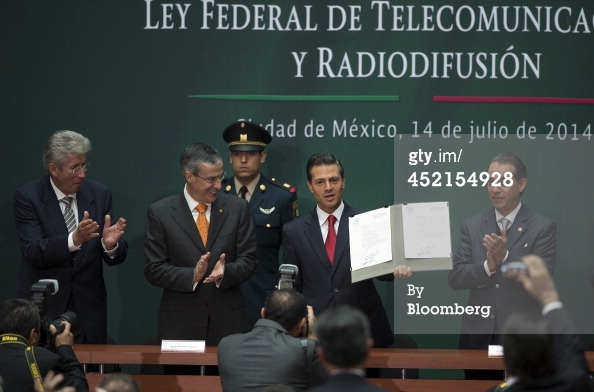Telecommunications and broadcasting in Mexico have been highly concentrated, which has affected users and the economy as a whole, resulting in low coverage, poor quality and expensive services, which in turn, has limited the exercise of freedom of expression and the right to information of Mexicans…
Telecommunications allow us to communicate at a distance, via numerous services, through which we issue and receive signs, signals, writing, images, sounds and any kind of data using cables, fiber optics or the radio spectrum (the space through which wireless signals are transmitted) as channels of transmission.
These services are commonly known as telephony, text messaging, Internet, Pay-TV or radio communication, provided by individuals or corporations, to which the government granted a license or authorization.
Telecommunications have the power to impact countries ‘economic and social development , as they are a fundamental element in strengthening growth and productivity. They are also an essential element in the development of democracy and access to culture, education, health, and in general, the full exercise of human rights. Because of their importance, many countries are making efforts to expand their telecommunications infrastructure and increase the coverage and penetration levels of these services.
Despite their positive impact, telecommunications and broadcasting in Mexico have been highly concentrated, which has affected users and the economy as a whole, resulting in low coverage, poor quality and expensive services, which in turn, has limited the exercise of freedom of expression and the right to information of Mexicans, and economic, social and cultural development.

Enrique Pena Nieto, president of Mexico, center right, holds up the signed enactment of the federal telecommunications law, next to Raul Cervantes Andrade, president of the Senate, right, Gerardo Ruiz Esparza, minister of Communications and Transport, left, and Jose Gonzalez Morfin, President of the Chamber of Deputies, second left, in Mexico city, Mexico, on Monday, July 14, 2014. (Photo: Susana Gonzalez/Bloomberg via Getty Images
Given this situation, it was decided to promote a structural change that would substantially increase competition in these sectors, thereby improving the well-being of Mexicans and the country’s economic potential. This change was achieved through telecommunications reform, comprising six main axes:
1) Expansion of fundamental rights. Freedom of expression and access to information and the rights of telecommunications and broadcasting service users are extended. The right of access to information and communications technology, including broadband and the Internet is recognized. The reform stresses that telecommunications and broadcasting are public services of general interest, as a result of which the state will guarantee that they will be provided under conditions of competition, quality, diversity, universal coverage, networking, convergence, free access and continuity.
2) Updating the legal framework of the telecommunications sector. To strengthen legal certainty, a convergent law regulating the use of the radio spectrum, networks and telecommunications services and broadcasting was enacted. It establishes a single concession regime for the provision of such services; and implements asymmetric regulation measures with which the main economic agents in these sectors must comply.
3) Strengthening the institutional framework. The Federal Telecommunications Institute (IFT), as an autonomous, constitutional body responsible for the regulation, promotion and monitoring of the radio spectrum, networks and the provision of telecommunications and broadcasting services was created. It will serve as the authority for economic competition in these sectors. Courts specializing in these issues have been set up to provide certainty for investment.
4) Promoting competition.The reform is in favor of users and against monopolies. Therefore, effective competition, will be encouraged by providing tools to reduce the IFT concentration levels . Up to 100 percent foreign direct investment will be permitted in telecommunications and communication via satellite together with up to 49 percent in broadcasting. Broadcasters are required to allow free, non-discriminatory retransmission of their signals by pay television companies, and in turn, have the right to have their signals retransmitted free and in a nondiscriminatory manner by pay television companies.
5) Establishing a Universal Digital Inclusion Policy and a National Digital Strategy. The Federal Executive branch will be responsible for this policy, which will include infrastructure, accessibility, connectivity, information and communications technology and digital skills. The aim is for at least 70 percent of households and 85 percent of micro, small and medium businesses to have high-speed Internet at internationally competitive prices.
6) Encouraging greater infrastructure coverage. The fiber optic backbone of the Federal Electricity Commission will be expanded and reinforced and a wholesale mobile shared network will be deployed using the 700 MHz band, which will be able to harness the backbone in order to have greater service coverage at lower prices to benefit more people.
Telecommunications reform is designed to eliminate monopolistic practices that have yielded extraordinary profits for preponderant agents to the detriment of the well-being of Mexicans and the country’s development. With more competition, Mexico’s telecommunications sector will have higher coverage levels and better penetration, and better quality services at affordable prices, particularly among historically disadvantaged areas and sectors of the population.
Source: http://reformas.gob.mx/


No comments:
Post a Comment